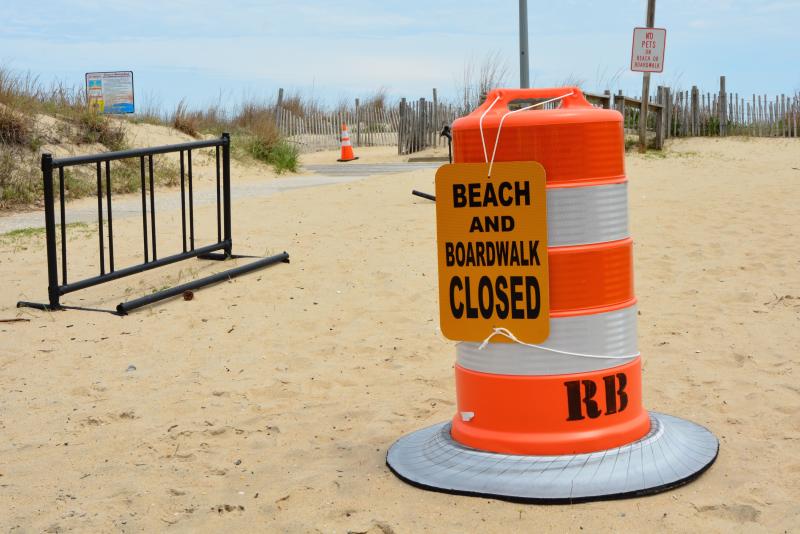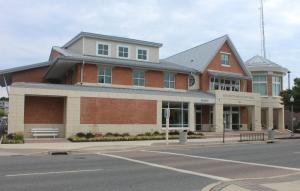Rehoboth braces to enforce emergency orders
In anticipation of warm weather and more visitors - with the beach and Boardwalk still closed because of COVID-19 - Rehoboth commissioners approved the purchase of better signage and a change to code to allow police officers discretion to charge individuals with civil offenses in addition to criminal offenses for violating an ongoing emergency order.
The decisions came during a commissioners meeting May 4, at the request of Rehoboth Beach Police Chief Keith Banks. It was the first commissioner meeting since March 20, when commissioners passed a $25 million budget for the 2020-21 fiscal year, which began April 1.
Beginning with the new signs, Banks said the city is currently using orange barrels with signs tied on by string. He said the barrels were a makeshift approach, but they’re not really stable enough and people can move them easily.
Banks said the new signs, placed at the Boardwalk end of each street, will be bigger and attached to a metal frame that’s much more stable. He said the estimated cost for the signs is $8,000, but he suggested the city might be able to be reimbursed through a grant because it was an expense related to the emergency.
As for the code change for violations of emergency orders, Banks said he requested it for two reasons - charging someone criminally can be cumbersome; it raises inherent safety issues because it requires fingerprinting and possible transportation back to the police station.
Most of the infractions are minor offenses, said Banks. Giving the police officers the discretion to write a civil citation means the officers are less exposed and it’s less intrusive for the public.
“This is not a new concept,” said Banks.
As approved, the new civil assessment carries a $100 fine. The criminal penalty carries a $500 fine with possible 60-day imprisonment.
Commissioners Lisa Schlosser and Ed Chrzanowski said they thought the fines should be higher. Chrzanowski said he was in favor of an escalating fee schedule, while Schlosser suggested a $1,000 fine to get the message across.
City Solicitor Glenn Mandalas said civil penalties tend to be more of an administrative issue, while the escalating fee schedules are for criminal offenses. The city charter, he said, does not allow for fines larger than $500.
Typically, Banks said, judges won’t support fines they think are too high.
If it’s about sending a message, Mandalas said, a civil assessment wakes most people up. Additionally, if an officer tells someone the next offense could lead to 60 days in jail, that will get a person’s attention.
COVID-19 effects on Rehoboth budget
City Manager Sharon Lynn began the meeting with an update on the budget. At this point, she said, there’s no way to tell how COVID-19 will affect revenue.
The city’s meters are scheduled to go into effect Friday, May 22. In 2019, Lynn said, the city made $190,000 in parking over Memorial Day weekend.
Given the unknowns, Lynn said the city is estimating roughly $400,000 in savings by significantly reducing the number of seasonal employees needed through June. She said because the beaches are closed, the number of lifeguards will be reduced from 70 to 20 and those hired will be under the control of Banks to help with enforcement on the beach; there is a four-person reduction of seasonal police officers; the street department will hire five fewer people; and the parking department will hire 22 people, 15 fewer than the normal 37.
In the interest of safety, Lynn said, there will be no permit sale locations on Bayard and Rehoboth avenues to begin the summer. All parking sales will have to be made at the parking department building behind city hall, she said.
The information kiosk on Delaware Avenue will not be open, she said.
These items are evaluated carefully on a daily basis, said Lynn. Only essential items are being purchased at this point, she said.
Schlosser said she had heard from some business owners about delaying the use of parking meters. She suggested a mid-June implementation.
Mayor Paul Kuhns said he understood the suggestion, but having parking rules in effect will help control the crowds while emergency orders are in place. Additionally, he said, it won’t be much, but there will be some revenue coming in.
Kuhns said he expects parking revenue to be cut in half from last year. “Maybe more,” he said.
Commissioner Susan Gay said she was in favor of keeping the parking requirements in place. The customers of the businesses are the customers of the city too, she said. It would be doing a disservice to not collect because it would affect essential services, she said.
“We need the revenue,” said Gay.
Lynn said businesses providing curbside service will continue to be allowed to have two designated spots in front of their business for customers picking up.
Chris Flood has been working for the Cape Gazette since early 2014. He currently covers Rehoboth Beach and Henlopen Acres, but has also covered Dewey Beach and the state government. He covers environmental stories, business stories and random stories on subjects he finds interesting, and he also writes a column called Choppin’ Wood that runs every other week. He’s a graduate of the University of Maine and the Landing School of Boat Building & Design.






















































